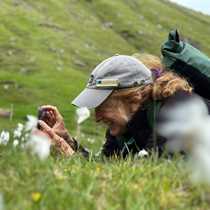Astoria and Homeward Bound
How do our pre-conceived ideas and images compare with our actual experiences? Pursuit by grizzly bears, walking through prickly pear cactus, being so hungry that the candles intended to illuminate the darkness become part of your dinner menu are just a few of the unanticipated experiences the members of the Corps of Discovery endured and overcame. Through these trials and tribulations their perspective of the West was most certainly altered.
We have visited a variety of historically, culturally and geographically significant sites. Their splendor and stories have been brought alive by the passion of those who shared them with us. Perhaps our experiences have changed our perspective of this landscape. How disappointed was Meriwether Lewis at not finding wooly mammoths in the Great Plains? Or was that disappointment drowned by the multitudes of new and exciting findings?
Would William Clark’s journal entries from their time spent along the Washington shoreline have a more gracious tone if he experienced the glorious spring weather we basked in today? Most certainly. And would Meriwether Lewis have delighted in poking his nose into the lovely salmon-colored blossom of this Rhododendron? Most assuredly, yes. He then would have plucked it, along with a good portion of the stem and leaves and sat down with his journal and described it in minute detail. Finally, he would have mashed it methodically between papers for drying and preservation. Today, Rhododendron macrophyllum, a plant Lewis noted and wrote about on November 30, 1805 is the Washington state flower. I think his perspective of what today is Astoria would have been brighter and more pleasant for seeing it cloaked in the blossoms of spring. It certainly was for us.
How do our pre-conceived ideas and images compare with our actual experiences? Pursuit by grizzly bears, walking through prickly pear cactus, being so hungry that the candles intended to illuminate the darkness become part of your dinner menu are just a few of the unanticipated experiences the members of the Corps of Discovery endured and overcame. Through these trials and tribulations their perspective of the West was most certainly altered.
We have visited a variety of historically, culturally and geographically significant sites. Their splendor and stories have been brought alive by the passion of those who shared them with us. Perhaps our experiences have changed our perspective of this landscape. How disappointed was Meriwether Lewis at not finding wooly mammoths in the Great Plains? Or was that disappointment drowned by the multitudes of new and exciting findings?
Would William Clark’s journal entries from their time spent along the Washington shoreline have a more gracious tone if he experienced the glorious spring weather we basked in today? Most certainly. And would Meriwether Lewis have delighted in poking his nose into the lovely salmon-colored blossom of this Rhododendron? Most assuredly, yes. He then would have plucked it, along with a good portion of the stem and leaves and sat down with his journal and described it in minute detail. Finally, he would have mashed it methodically between papers for drying and preservation. Today, Rhododendron macrophyllum, a plant Lewis noted and wrote about on November 30, 1805 is the Washington state flower. I think his perspective of what today is Astoria would have been brighter and more pleasant for seeing it cloaked in the blossoms of spring. It certainly was for us.




